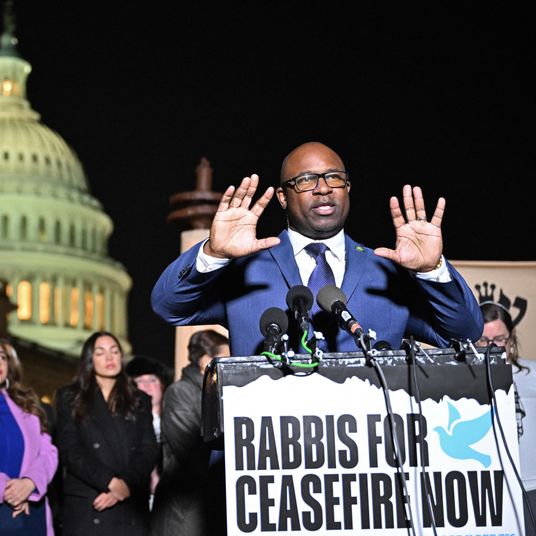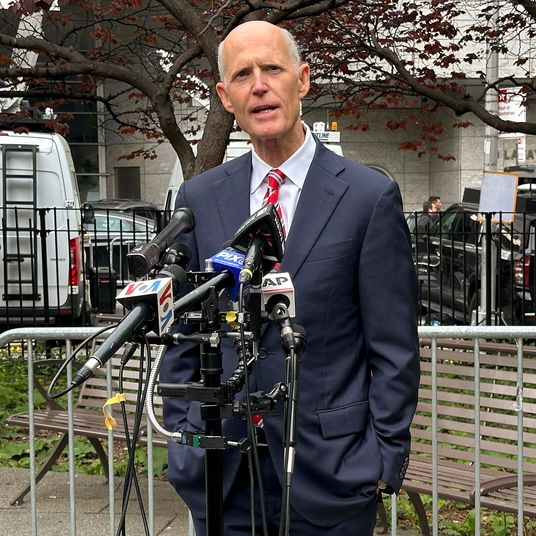One of the perks that comes with commissioning polls is that you generally get to spin the results. That’s most definitely true with a new poll billed with this screaming headline: “NEW MARIST POLL: AMERICANS MAKE DRAMATIC AND SUDDEN MOVE TOWARD PRO-LIFE LABEL.” The poll sponsor in question was the Catholic men’s organization the Knights of Columbus, which has militantly opposed legalized abortion for many decades.
The Knights have had a history of finding what they are looking for in polls on abortion policy. In their analysis of a 2016 Marist poll they commissioned, the organization explained why numbers showing a majority of Americans identifying as “pro-choice” disguised strong support for abortion restrictions. Now that a similar poll shows “pro-choice” and “pro-life” identification tied at 47 percent, these previously misleading labels suddenly matter a great deal.
Indeed, the Knights draw flashing red arrows to a one-month shift in the “pro-choice” and “pro-life” numbers, which were at 55/38 (respectively) in January, and attributes the change mendaciously to “efforts in several states to legalize abortion up until birth.”
Now it’s true that in the last month President Trump led a campaign to depict a new law in New York, and a proposal for a new law in Virginia, that lay firmly within the 46-year-old framework of Roe v. Wade, as “efforts to legalize abortion up until birth.” Perhaps the brouhaha erroneously convinced some people that something new and monstrous was afoot. But more likely the “dramatic and sudden move” is attributable to statistical noise:
More fundamentally, the “pro-choice” versus “pro-life” dichotomy is vague and largely meaningless, because it may indeed depend on whatever marginal abortion-related issue has been loudly in the news recently. That’s not to say anything’s really changed. According to a 2016 estimate: “There are approximately 600 abortions a year after 24 weeks and most are for fetal anomalies.” And as provided for in Roe, any legal post-viability abortions require showing that the health of the women involved would be seriously threatened.
More fundamentally, as my colleague Irin Carmon explained with respect to an earlier KofC/Marist poll, abortion surveys are loaded with contradictions and non sequiturs:
[T]he Knights of Columbus poll found that 61 percent of Americans support banning abortion after 20 weeks, and 68 percent oppose taxpayer funding of abortion. But even that can be malleable when more factors are added to the question. For example, a Hart Research survey commissioned by Planned Parenthood found that the same number of Americans would oppose a 20-week ban if a doctor determined the fetus isn’t viable, which happens several weeks later, or in cases of rape, incest or health issues. “Once voters consider the range of circumstances in which abortions would be made illegal under most 20-week abortion ban proposals, a majority of Americans oppose them,” pollsters Geoff Garin and Molly O’Rourke wrote.
And even when abortion opponents focus on the insanely tiny number of late-term abortions and tilt the deck farther by calling them “partial-birth abortions,” polls have shown solid majorities of Americans insisting on an exception to any ban for threats to the health of the woman — precisely the position of pro-choice advocates.
Far more relevant, in my opinion, than any double- or triple-loaded question on a particular type of abortion, or any vague false choice between vaguely defined positions, is the simple and politically crucial question of support for or opposition to Roe. Public opinion on that question has been relatively stable for decades, though the constituency for overturning Roe has gradually eroded (as of 2018, a NBC/Wall Street Journal poll found 23 percent favoring reversal of Roe and 71 percent opposing). Yes, there are undoubtedly people who want to maintain Roe who identify as “pro-life,” and others who think there’s some sort of epidemic of late-term abortions. But when it comes to the basic constitutional law of reproductive rights, there’s no evidence the Knights of Columbus are on the brink of winning the argument.
























